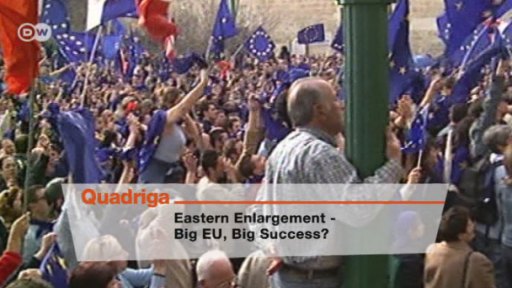Quadriga - Eastern Enlargement - Big EU, Big Success?

This browser does not support the video element.
On May 1st 2004 the EU welcomed 10 new countries into the fold; the Mediterranean Island states Cyprus and Malta as well as the former east-block nations, Estonia, Latvia, Lithuania, Poland, Slovakia, Slovenia, the Czech Republic and Hungary. In 2007, Bulgaria and Rumania also joined the bloc.
For the new countries, EU membership promised economic growth and prosperity. But membership also brought challenges. Many countries experienced large-scale outflow of skilled labor and had to implement costly EU regulations on farming and industry. The old EU member states feared an influx of cheap labor could undercut wages.
What’s the picture now ten years after EU enlargement? And does the EU have a solution for the growing support of euro-skeptic right-wing populist parties?
Tell us you opinion: Eastern Enlargement - Big EU, Big Success?
Our guests:
Katarzyna Stoklosa – is a cultural scientist from Poland. She studied at the European University Viadrina in Frankfurt on the Oder and also at the Moscow State University in Russia. After completing her studies, she worked in numerous institutes. In 2003, she then took over leadership of the Central and Eastern Europe department at the German Council on Foreign Relations. Today, she works at the Hannah Arendt Institute at the Technical University of Dresden and also as an assistant professor in the Department of Border Region Studies at the University of Southern Denmark.
Judy Dempsey - After training as a journalist in Ireland, Ms Dempsey embarked on an international career: From the 1980s to early 1990s she reported from eastern Europe. In 1996 she took over the Financial Times' bureau in Jerusalem where she remained until 2001. Judy Dempsey has won numerous awards for her work, including the Anglo-German Prize and the Foreign Press Association Award. She was a Columnist for the International Herald Tribune and works now as a Senior Associate at Carnegie Europe and editor-in-chief of Strategic Europe.
Michael Stürmer – He is the senior correspondent at the German daily "Die Welt". He studied History, Philosophy and Languages in London, Berlin and Marburg. Stürmer taught History at Erlangen University and was a visiting professor at Harvard, Toronto, the Sorbonne and Bologna. In the 1980s Stürmer served as a political advisor to German Chancellor Helmut Kohl. He is the author of several key works on German, European and Russian history and politics.